Today’s debates were definitely the most sparsely attended, as seen here: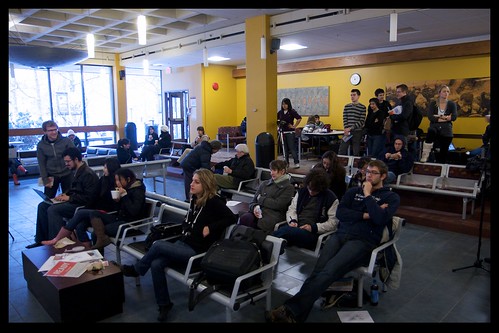
It’s too bad this debate was empty; I thought this was the best chance to get a feel for the candidates, since they’d had a chance to thoroughly adjust their platforms and approaches.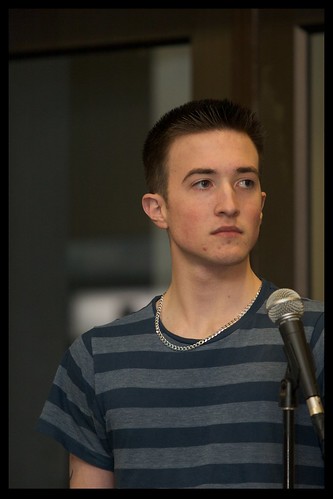
VFM Coordinator Mitch Wright moderated the debates, as AJ was apparently nowhere to be found. He did a capable job, once again requiring candidates to stay within their timeframe, but unfortunately continuing the tendency to disallow actual debate.
First up were the presidential candidates: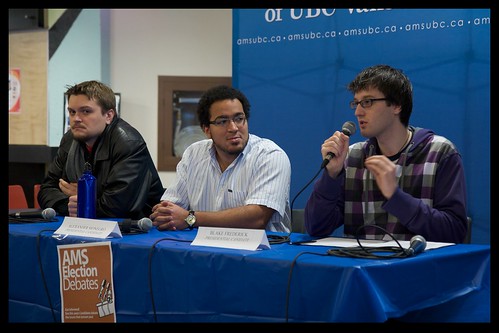
After a week of speaking, I felt that they were (finally) on top of their game. Blake’s core message was, as Naylor put it, “I am experienced and not crazy”, a far cry from his fiery showing at the first debate (which he tempered with an interesting personal anecdote about familial and socioeconomic barriers to university). Alex moved away from his earlier focus on facilitation and team leadership (which are, admittedly, an important part of the role) and opened with commentary on education and engagement. Paul retained and reiterated his desire to communicate and lead via consultation.
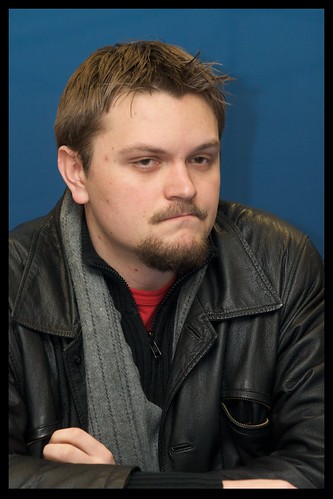
Paul clings to his outsider status, and resultantly I still don’t understand how proclaiming your lack of operational and institutional knowledge of the society you aim to lead can be spun as a positive. The AMS is a complex and occasionally infuriating organization to work with and/or for, and every day on the job spent learning the ropes is a day that could’ve been spent getting the job done. Michael Duncan’s immense knowledge of both people and procedure within the Society allowed him to very effectively use his time in office and I don’t see Paul being able to carry that forward.
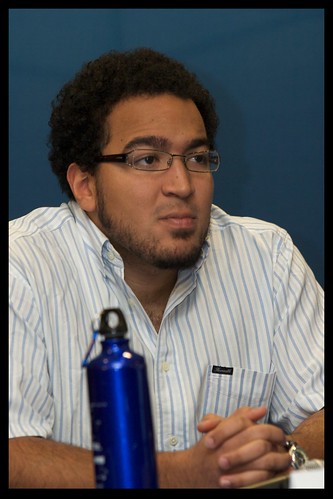
As I’ve watched more debates and read through more material, I’ve come around to liking Alex more. I spent a year as the President’s Assistant, allowing me to see a lot more of the daily happenings in the Executive Offices than most people, and with that in mind Alex’s focus on teambuilding and stress on inter-Executive relations while maintaining personal goals and focus items seems both achievable and sensible. While nothing he’s said struck me as particularly soundbite-worthy, Alex has a good grasp on the challenges ahead of him. His platform as presented doesn’t really say anything, which is sort of strange.
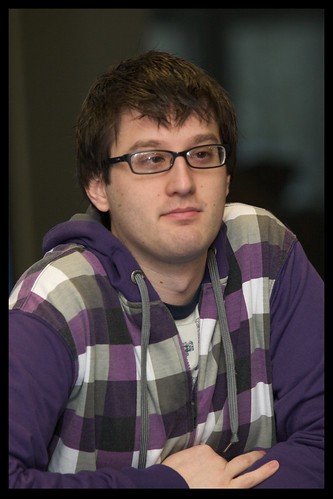
I like a lot of what I hear from Blake, but I don’t know how much of it is possible. It’s clear that he isn’t afraid to play politics, although his occasional tendency to trip over himself could cost him in heated discussions. Blake has a lot of institutional knowledge from his years as AVP Academic and AVP External, but I’m unsure of his abilities to shape a team from a group of people who had just emerged from the concentrated antagonism of elections. Combine with his desire to run for Board and his singular approach to peculiar difficulties of doing either job, let alone both, and I’m left standing in the “damnit Blake you’d be a shoo-in for VPX” camp.
The other debate today was for the two Board of Governors seats: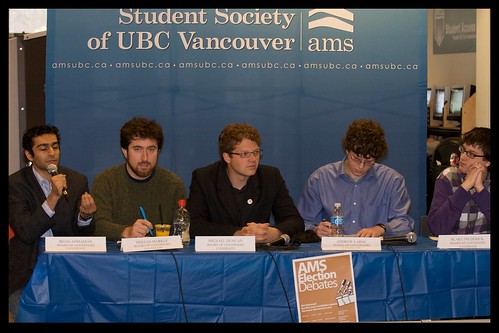
from left to right we have: Bijan Ahmadian, Tristan Markle, Michael Duncan, Andrew Carne, and Blake Frederick.
Bijan remains mired in his farm endorsement trading scandal. When pressed, he gave basically the same statement as was sent to the VFMs yesterday, and when Serious Steve asked him if he was, right now, committed to the Farm in its current size and location, he demurred and said that he would need to learn more about the farm before making a decision. I’m also curious about his workload; as a combined JD/MBA student, Bijan is taking 131 credits of graduate study over four years (per the Sauder MBA/JD website) to complete two professional programs simultaneously that are far from easy on their own. Frankly, I find it hard enough to make time for everything I do as an undergrad and have serious doubts as to whether Bijan would be able to work out all his commitments, or if something will give (and what that will be.)
Tristan continues to underline the importance of the SUB Renew project, and also uses it as a pivot to increase student engagement and empowerment on campus. His BoG projects intersect with his reelection plans in the VP Admin spot, and while he did suffer a bit of platform overlap (collision?) with Michael Duncan, he was able to stand out from the pack of other candidates. Bijan attempted to lay blame for the freeze in negotiations on SUB Renew since November at Tristan’s feet, but Tristan was able to explain how it was a necessary tactic and one approved by council (as per Naylor) but Tristan let slip some items that were discussed in camera which is unwise in the best case and litigatable in the worst.
Mike presented a lot of successes from his Presidency and some goals for his BoG term. As mentioned above, he’s had a strong year in office and wants to carry that momentum forward, along with his experience with multiple levels of administration and unique ability to engage. I hope he doesn’t show up at BoG painted blue.
Actually, no. I hope he does; I just want to see what would happen.
Andrew was unable to make it to the first debate due to his involvement at the Western Engineering Championships in Regina. He provided a strong showing at this debate, informing students of his attendance of Board meetings out of personal interest for the past 1.5 years, his plans to more effectively communicate about the Board to students, and demonstrating the strong, informed voice he wants to bring to the Board to represent students.
Blake’s BoG plans dovetail neatly with his Presidential ones, which led to a question about how he plans to balance the workload and focus of both roles. The question didn’t really get an answer, which was disappointing; while Blake did point to Jeff Friedrich (President+BoG 2007-08) as an example, there were no ways or means given. Blake did, again, temper his speech from previous debates, choosing to focus on development and Farm issues rather than his prior goals of reforming governance and changing the way students are seen by administrators. I can’t tell if he’s worried about claims of idealism or if it’s a simple rethinking; either way it’s a lot less interesting.






Discussion
Comments are disallowed for this post.
Comments are closed.